A low GPA, or grade point average, is a measure of a student’s academic performance. It is calculated by dividing the total number of grade points earned by the total number of attempted credit hours. A low GPA can have a number of negative consequences, including making it more difficult to get into college, graduate school, or find a job.

What is a Good GPA?
There is no one-size-fits-all answer to the question of what is a good GPA. However, most colleges and universities consider a GPA of 3.0 or higher to be good. A GPA of 4.0 is considered to be excellent.
What is a Low GPA?
A low GPA is generally considered to be anything below a 2.0. However, some colleges and universities may consider a GPA of 2.5 or even 3.0 to be low.
What are the Consequences of a Low GPA?
A low GPA can have a number of negative consequences, including:
- Making it more difficult to get into college
- Making it more difficult to get into graduate school
- Making it more difficult to find a job
- Lowering your salary potential
- Limiting your career opportunities
How to Improve Your GPA
If you have a low GPA, there are a number of things you can do to improve it. These include:
- Studying more effectively
- Attending class regularly
- Taking advantage of tutoring and other academic support services
- Choosing easier courses
- Dropping courses that you are struggling with
- Retaking courses that you failed
Conclusion
A low GPA can have a number of negative consequences. However, there are a number of things you can do to improve your GPA. If you are struggling with your grades, talk to your teachers, counselors, or academic advisors. They can help you develop a plan to improve your academic performance.
